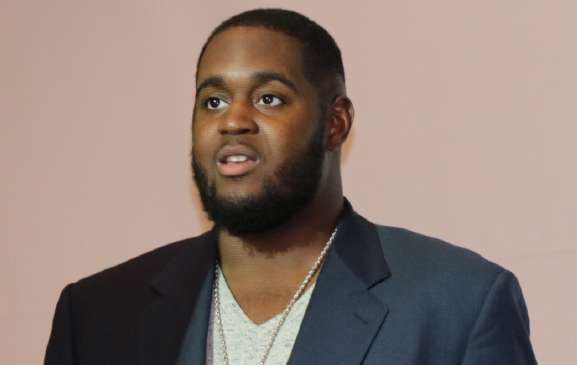
Ayanna Totten
Contributing Writer
Marvin Gaye’s silky tenor voice traveled through room 117 in Stroud Hall. Dominique Washington walked across the stage with a rhythmic finger snap.
He’s ready, he’s confident and he has a story to tell.
After an introduction from Juanita Jenkins, the director of multicultural affairs, Washington poses a question to the audience: “How does a computer work?”
Hands shoot up to deliver a seemingly simple answer, but Washington presents a greater analogy.
Similar to human beings, computers need a modem or brain to function. If the modem isn’t operating properly, a computer is susceptible to viruses, or the device won’t work at all.
When your brain is sick, everything else gets sick.
This theory is illustrated in his new book “Disease of the Mind.”
“Why is it that we don’t pay as much attention to our brains as we do everything else?” he asks.
He admits he used to hide behind the illusive “I’m fine” until he accepted that trying to resolve issues on his own caused more pain than if he would’ve just asked for help.
The ESU alumni attempted suicide two times before the death of his mother during his junior year in college.
Many nights he would go to sleep and pray he wouldn’t wake up.
School wasn’t important anymore, and his GPA plummeted from the 2.9-3.0 range to a 1.5.
However, Washington recommitted himself to writing, a skill his childhood therapist instilled in him. His work revealed a reality he already knew: he wasn’t okay.
Overcoming his pride, he eventually utilized ESU’s Counseling and Psychological Services (CAPS) on the second floor of the Flagler-Metzgar building.
“Don’t get to your lowest point before you ask for help,” Washington emphasizes.
Washington’s third book, “Disease of the Mind” focuses on depression and other mental health issues.
“The reason why I wrote a book about depression is because so many of my friends are like me. We don’t ask for help. We’re the person everyone goes to when they need help. How dare us ever need help?” he said.
He continued to explain that one of the hardest things to do is admit to yourself that you have a problem.
“I could have 45 fires in front of me, but I’d rather put yours out than deal with mine,” he said.
Although the recent death of his stepfather forced him to fight the same emotional and mental battles he faced in “Disease of the Mind,” he’s more equipped to handle them because he’s willing to seek help now.
Washington’s other books, “Life: The Struggle of a Man” and “Black: Can a Black Man Survive in America?” cover manhood and the African-American experience.
“For me personally, poetry equates freedom. I can have a rhyme scheme that I pick,” he said.
“I don’t have to limit myself to boundaries set by other genres per se. When it comes to poetry, me and the pen have a relationship that no one else can break.”
Washington also stated that poetry exposes your vulnerabilities to strangers, which can be discomforting.
Nonetheless, he upholds a responsibility that transcends his world.
“I could’ve sold one book, and I would’ve been okay with that because at least one person was able to hear my story [that] may have helped them,” he said.
“So, I stopped looking at it as it’s about me. It’s how can I help someone else?”
Later in the conversation, Washington encouraged attendees to explore why mental health is such a taboo topic, which inspires a dynamic dialogue.
“Showing emotion kind of like shows weakness,” attendee Isaiah Clemens said.
“No one wants to feel weak or like someone else can’t depend on them.”
Jenkins elaborated on this idea and explained that in black, brown and economically disadvantaged communities, no one has time to address defects because resources are already scarce, and people are expected to contribute to the common good.
“Depression can’t be a level of immobility,” she said.
Waleed Edwards shared a more personal perspective about how culture and upbringing affect mental health. Communicating his feelings to his girlfriend or expressing appreciation are often difficult because he wasn’t raised to show emotions.
The Dean of Student Life, Cornelia Sewell-Allen, recently researched the reasons why students choose to seek help or not.
Beaming with excitement as she realizes tonight’s conversation reflects her results, Sewell-Allen discussed how generational knowledge, access barriers, stigmas and culture all determine how people approach mental health because they become disabling factors or enabling resources.
Fortunately, Washington has stayed with the ESU family as an academic success coach for the STAR (Students in Transition to Academic Realization) program. He believes his mental health awareness helps him “dig deep.”
Answering surface questions is easy, but analyzing a student’s personal motivations or home environment will develop a clear picture about how they can achieve academic success.
As far as his writing career is concerned, Washington agreed that socially relevant poetry is his niche.
“What people can expect from me is to always be real, always be raw and to always be willing to give a piece of myself to help them give a piece of theirs,” he said.
Email Ayanna at:
atotten@live.esu.edu

